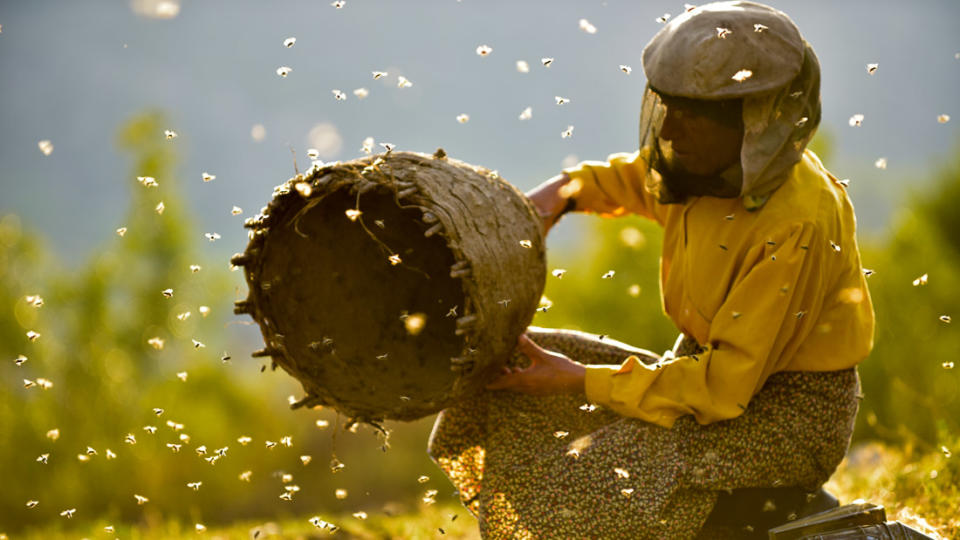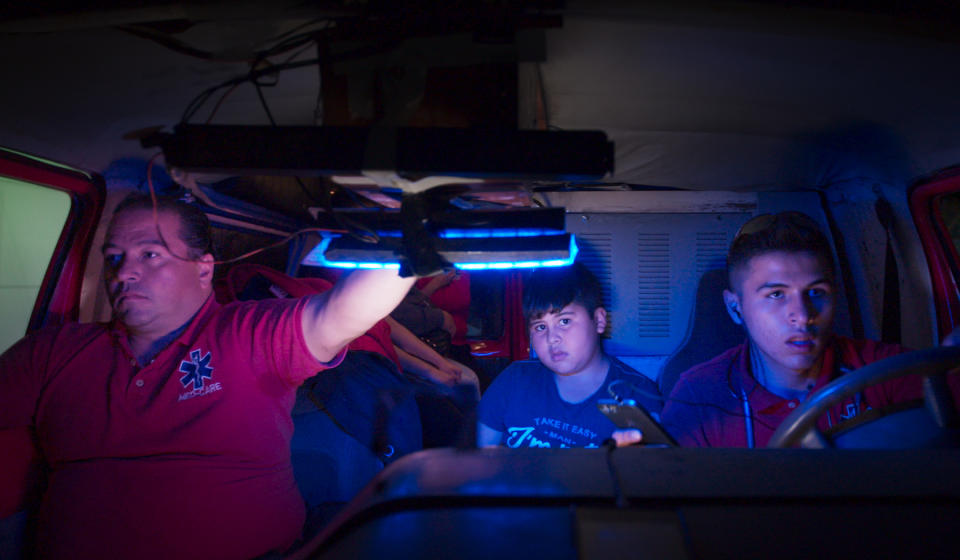8 Must-See Films From Emerging Filmmakers at This Year’s New Directors/New Films

Dedicated to the discovery of new works by emerging and dynamic filmmaking talent, this year’s New Directors/New Films festival will screen 35 features and shorts from 29 countries across four continents, with 10 North American Premieres and two World Premieres, 15 films directed or co-directed by women, and 11 works by first-time feature filmmakers.
The Opening, Closing, and Centerpiece selections are the New York premieres of three Sundance award winners: opening the festival is Chinonye Chukwu’s “Clemency,” which won the U.S. Dramatic Grand Jury Prize and features a masterful performance from Alfre Woodard as a prison warden struggling with her work; Centerpiece is Alejandro Landes’ “Monos,” a new reimagining of “Lord of the Flies” and winner of a World Cinema Dramatic Special Jury Prize; and closing ND/NF is Pippa Bianco’s “Share,” a contemporary portrait of a sexual assault victim, which took home U.S. Dramatic prizes for Breakthrough Performance and Screenwriting.
Related stories
SXSW 2019: 14 Must-See Films at This Year's Festival, From 'Us' to 'Booksmart'
Tribeca Announces 2019 Lineup, Achieves Gender Parity in Competition For First Time
Now in its forty-eighth year, ND/NF has played home early films from such heavy hitters as Steven Spielberg, Spike Lee, Chantal Akerman, Pedro Almodovar, Richard Linklater, Darren Aronofsky, Christopher Nolan, Laura Poitras, Andrea Arnold, Ben Wheatley and that is just the tip of the talent it has embraced. It’s a proving ground — and one with a proven track record.
ND/NF runs March 27 – April 7 in New York City. Ahead, check out the 8 titles we are most excited to check out at this year’s event.
“A Land Imagined”
Singapore is 22% larger than it was in 1965, and home to twice as many people. That sort of thing doesn’t happen naturally — but, thanks to the industrial sorcery of land reclamation (a process that involves importing rock and sand from other places and using them to build out the seas), there’s almost no limit to the boundaries of urban development. Essentially doing for sand what “Chinatown” did for water, Yeo Siew Hua’s Locarno-winning “A Land Imagined” processes the country’s growth through the framework of an elusive and hypnotic dream noir. Layered beneath humid synths and baked under sumptuous wide shots of the machinery twinkling along the island’s terraformed shores, the film stars Peter Yu as a detective tasked with investigating the disappearance of a Chinese migrant worker. That premise, of course, is little more than a push down the rabbit hole, as the search for the missing laborer soon melts into something considerably more abstract. How much Earth can Singapore import before it becomes another place entirely? Hua’s beguiling film addresses that question as best it can, blossoming into a clever analogue for the soul of a country in transition.—DE
“Clemency”
Chinonye Chukwu’s masterful prison drama “Clemency” arrives at New Directors/New Films after taking home the U.S. Grand Jury Prize at the Sundance Film Festival earlier this year. Even without the prestigious honor, Chukwu’s unrelenting eye behind the camera and matter-of-fact screenwriting make the film a no-brainer for ND/NF. “Clemency” stars Alfre Woodard as a prison warden whose career in overseeing executions has resulted in emotional detachment at work and at home. Aldis Hodge plays the warden’s next execution victim, who may or may not be wrongfully imprisoned. Chukwu boldly tracks these two characters as they brace for an inevitable tragedy, making sure neither comes off as hero or villain. Each scene is a challenge Chukwu’s characters fight through, and she ensures the viewer feels the grueling weight of the situation through pacing and editing. The final 10 minutes will break open your heart like few movies this year, maybe ever. —ZS
“Fausto”
ND/NF, which makes this Angeleno more envious of cinephiles in New York than anything else (sorry, NYFF!), has served as the launching pad for many a great filmmaker over the years. Andrea Bussman could join that list, as “Fausto” looks to strange to ignore: A melding of the Faust mythos and Mexican folklore that touches on everything from shapeshifting to telepathy, it takes place on the Oaxacan coast in four different languages (Spanish, English, French, and Arabic) and could be the most avant-garde offering in this year’s lineup. Few festivals exemplify the spirit of discovery quite like ND/NF, and Bussman’s solo directorial debut (she helmed 2016’s “Tales of Who Dreamt” with Nicolás Pereda) sounds like a genuine curio waiting to be seen. —MN
“Honeyland”
“Honeyland”
Winner of three Grand Jury prizes at Sundance — cinematography, originality, and best World Cinema doc — “Honeyland” is a perfect piece of nonfiction filmmaking. The story of how a bee hunter’s life, which revolves around caring for an elderly mother and honey, is upended when by a nomadic family moves into her abandoned village. The struggle between a woman’s oneness with nature versus a reckless patriarch becomes an allegory of everything wrong with our world. It’s impossible to not feel for the quiet, lonely decency of Hatidze, an early candidate for 2019’s best protagonist, but it is the way her journey is filmed that makes this such a special film. Directors Tamara Kotevska and Ljubomir Stefanov capture both character and conflict in verite moments shot with lush beauty and yet surprising formal rigor. —CO
“Joy”
A young Nigerian woman is caught in the cycle of sex trafficking in this realist drama from Austrian-Iranian filmmaker Sudabeh Mortezai, who has established herself as the leading auteur of the European migrant experience on film. Working to pay off a debt to the brothel madam who sponsored her immigration, Joy (Joy Anwulika Alphonsus) sends money home to family in Nigeria while supporting her young daughter in Vienna. When she is given a young Nigerian protégé to train, she begins to question her role in the brutal human trafficking machine. Mortezai also wrote the script for her second feature film, as she did for her debut effort, “Macondo,” which premiered in competition at the Berlinale in 2014. She researched heavily within Nigerian immigrant communities in Vienna, and, a bit like Sean Baker’s “Tangerine,” cast many first-time actors with direct experience of sex work. The feminist film centers women on all sides, including the ones doing the exploitation. “Joy” premiered at the Venice Film Festival, and took home the top prize at the BFI London Film Festival. —JD
“Midnight Family”
“Midnight Family”
Mexico City is a sprawling urban metropolis of nine million people, but it only has 45 official emergency ambulances to deal with its entire population’s needs. That alarming statistic sits at the center of Luke Lorentzen’s intimate verite documentary, which follows members of the Ochoa family as they track emergencies around the city and dash around trying to offer their services before the competition gets there first. As they speed through traffic and contend with hospitals not always willing to pay for their services, the Ochoas emerge as fascinating embodiments of a country working overtime to correct its shortcomings and keep the lights on. This bracing U.S. competition documentary is poised to provide a personal window into the fast-paced mayhem of Mexico after dark. —EK
“Share”
In his Sundance review of Pippa Bianco’s feature debut, IndieWire’s David Ehrlich described the thoroughly modern drama in both colorful and sobering terms: “Imagine if ‘Eighth Grade’ had been directed by Michael Haneke.” Bianco has expanded her 2015 short of the same name into a searing and terrifyingly prescient look at what happens when the worst possible thing not only happens to a young woman, but is then recorded, distributed, and splashed all over the internet. Bianco’s handle on the way the internet — and the people who live on it, especially the younger generations who haven’t known a world without it — works is deep and, even in the film’s darkest moments, propulsively entertaining. The urgency of Mandy’s (British newcomer Rhianne Barreto) predicament is meted out early on, as the high school student wakes up to a series of increasingly urgent alerts on her phone (that’s… well, that’s never good), and is soon forced to grapple with whatever happened (or didn’t) the night before. Part thriller, part social drama, Bianco and her star weave through a fraught and uncomfortably timely narrative to arrive at some startling ends. —KE
“Temporada” (“Long Way Home”)
In order to take a new job as an employee in the public sanitation department, Juliana moves from inner city Itaúna to metropolitan Contagem in Brazil. While waiting for her husband to join her, she adapts to her new life, meeting people and discovering new horizons, trying to overcome her past. With his second feature, Brazilian filmmaker André Novais Oliveira presents an atypical look at life in the suburbs of his home country, challenging common stereotypes. And it’s a welcomed change of pace, as the lives of characters who are often marginalized on-screen, are given center stage. Led by Grace Passô as Juliana, the cast is a mix of professional and non-professional actors, including members of Oliveira’s own family, who also appeared in his first film. What results is a very humane, affectionate portrait of a family in flux from a filmmaker seemingly getting comfortable with his own style. —TO
Sign up for Indiewire's Newsletter. For the latest news, follow us on Facebook, Twitter, and Instagram.



